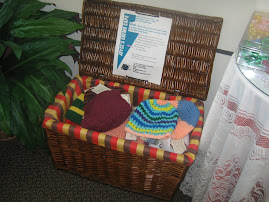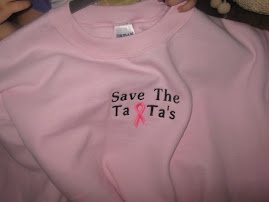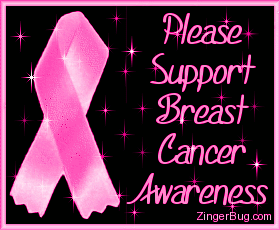This was an article I found on the internet. It was actually published at Christmastime, 2008 by the Cancer Council Victoria in Australia. It's still useful information so I thought I would put part of it on Joyce's Chemo Caps blog.
Celebrating Christmas can be difficult for people who have experienced a major change or loss in their life. Feelings of loneliness, isolation and sadness are common and Christmas traditions can be painful reminders of how different life has become.
Coping strategies
Sharing experiences and coping strategies can help people get through difficult times.
If you are in treatment for cancer: Set realistic expectations
Consider online shopping and/or gift vouchers for Christmas presents. This can save both time and energy.
If you're experiencing financial issues, consider ‘Kris Kringle' or making home-made gift vouchers for things such as babysitting, gardening, or a picnic.
Booking Christmas lunch or dinner at a restaurant, arranging a picnic at a local park, or simply asking people to bring a contribution to the Christmas meal can reduce stress.
If you're having treatment over Christmas, consider having a low-key day on December 25 and plan a celebration at the end of treatment.
Express your needs.
Tell others if you're finding it difficult to cope and accept offers of help. Be specific about things people can do to assist.
Be gentle with yourself.
Give yourself permission to get through Christmas the best way you can. Try to accept any limitations and remember Christmas doesn't have to be perfect.
Mood swings and feelings of loss are common over Christmas. Allow yourself some time to grieve and reflect.
Have an exit plan prepared for times when you may find a family gathering or party overwhelming.
Keep activities simple and non-strenuous.
Fatigue is a common side effect after cancer treatment. Avoid overwhelming numbers of visitors and long car trips. As energy levels may fluctuate, sometimes it can be helpful to plan the day's activities and then halve them. Allow for rest time during the day.
Keep meals simple. If the person with cancer has had to change their diet, serve food that can be enjoyed by everyone.
Create new rituals:
If your usual Christmas rituals or traditions are too painful, consider replacing with a new ritual or tradition that is special to you.
Seek support:
Talking to someone about your feelings can reduce feelings of distress and isolation. Family and friends can be a good source of support.
We, at Joyce's Chemo Cap Project, hope you have a Blessed Christmas and a Happy 2010.
Sunday, November 29, 2009
Again, Another Email from Emily
I am a patient of Dr. Stones and I want to tell you how much I enjoy the chemo caps. I have used them on days I don't really need a wig and they make me look and feel good, and healthy. Thanks for making these caps.
Emily
Emily
Email Received from a Capper in Richardson TX
I am not dreading going bald in the next week and a half, partly because my husband and I picked out a few caps from the box in the Baylor Plano infusion room. They go with different outfits and they look great and I am so grateful that you provide them to people undergoing chemotherapy. I almost bought one or two in a store before I started chemo and then I was so happy to see that people care enough to provide them for free for patients. The other day I was in chemo and I saw a bald young mother with two young daughters and they had a couple beautiful pink knit caps they were going home with.
I think it is a wonderful way you are keeping Joyce Schmitt's memory alive. The caps from the box mean so much more to me than any hat I could have bought in a store. I think a cap will be so much easier to wear than a wig!
Lisa
I think it is a wonderful way you are keeping Joyce Schmitt's memory alive. The caps from the box mean so much more to me than any hat I could have bought in a store. I think a cap will be so much easier to wear than a wig!
Lisa
Thursday, November 26, 2009
Call from a 'happy capper'
Yesterday we received a call from Carla. She just received her first treatment yesterday and while she was getting her infusion, looked down and there was this beautiful purple (her favorite color) on top of a pile of caps in a box. She was so happy to know that she could have the cap and wanted to thank us for it. Her husband told her that the cap was meant for her. I agreed. I told her she could take another cap and she said "Oh no, this is the one I want and I will cherish it. Let others take the other caps". She is a very nice lady. She told me that she would make caps if she could knit but she doesn't know how. I told her that her call to us means so much and that is enough for her to do. It's so good to hear from people like Carla!
Charles Woodson Donates $2 million
Charles Woodson wants to be known as more than a football player.
Donating $2 million to the new University of Michigan Mott Children’s Hospital and Women’s Hospital gives him a chance to do that.
The school announced Woodson’s gift on Thanksgiving before he played for the Green Bay Packers against the Detroit Lions.
Woodson’s money will support pediatric research by The Charles Woodson Clinical Research Fund in the $754-million, 1.1-million square foot hospital slated to open in 2012.
He hopes to attract the world’s best researchers who want to help children with cancer, heart disease, kidney disorders and autism.
Woodson said during a visit to Ann Arbor earlier this month that becoming a father motivated him to make the gift.
Donating $2 million to the new University of Michigan Mott Children’s Hospital and Women’s Hospital gives him a chance to do that.
The school announced Woodson’s gift on Thanksgiving before he played for the Green Bay Packers against the Detroit Lions.
Woodson’s money will support pediatric research by The Charles Woodson Clinical Research Fund in the $754-million, 1.1-million square foot hospital slated to open in 2012.
He hopes to attract the world’s best researchers who want to help children with cancer, heart disease, kidney disorders and autism.
Woodson said during a visit to Ann Arbor earlier this month that becoming a father motivated him to make the gift.
Monday, November 23, 2009
Thanksgiving
We at Joyce's Chemo Cap Project want to wish everyone a Happy Thanksgiving. To those who are now going through treatments and surgeries, to those that are now Survivors and to all of your families and friends that are going through or went through the healing process with you, we want to say 'God Bless each and every one of you'.
If you've received our caps, we hope that the caps helped make you comfortable and that you enjoyed wearing our caps.
We also want to thank all of those that made caps for us, those that contributed to our yarn supply and those who encouraged us to continue with our project. May all of you have a very Happy Thanksgiving.
If you've received our caps, we hope that the caps helped make you comfortable and that you enjoyed wearing our caps.
We also want to thank all of those that made caps for us, those that contributed to our yarn supply and those who encouraged us to continue with our project. May all of you have a very Happy Thanksgiving.
Wednesday, November 18, 2009
Recent News Regarding Mamograms
There have been reports on the news lately that is advising women to wait until they are 50 to have a mamogram and older women need only to have a mamogram every other year. This news has upset many people in the medical field. Following is an article regarding the news and is very important for all women to read.
YSC Responds to New Mammography Guidelines
While the new U.S. Preventive Services Task Force's recommendations on screening mammography, clinical breast exam and self-examination do not directly impact the young breast cancer survivors served by Young Survival Coalition (YSC), we are concerned about the recommendation of such significant changes. Although mammograms are not perfect tests, the evidence has clearly shown that they save lives in older women and should be available for all women for whom such screening is appropriate. Further, the Task Force's recommendations deal only with average risk women, not screening in higher risk women including screening residual breast tissue of young and old survivors. For these populations there is not enough scientific data to change current recommendations. YSC believes that better tools are urgently needed for younger women regardless of their risk level. This current debate regarding the effectiveness of mammograms highlights the issues facing young women. While over 11,000 women under 40 in the United States are diagnosed with breast cancer annually, there is still no screening method for early detection of breast cancer in young women. Survival rates for young women diagnosed with breast cancer are significantly worse than their older counterparts and the disease is often detected at later stages and is found to be more aggressive. Without access to proper and timely care, a woman's odds for survival decrease.
Mammography has been found to be an ineffective screening mechanism for this population because of their breast density. Accordingly YSC urges all young women to be familiar with their bodies, know their own personal risk factors for breast cancer, be aware of the signs of breast malignancies and to promptly consult with their health provider if they have any health concerns.
For more information contact:
Dana Griffin
Communications Manager, YSC
This email was sent by: Young Survival Coalition
61 Broadway, Suite 2235 New York, NY 10006 USA
We respect your right to privacy - view our policy
Manage Subscriptions | Update Profile | One-Click Unsubscribe
YSC Responds to New Mammography Guidelines
While the new U.S. Preventive Services Task Force's recommendations on screening mammography, clinical breast exam and self-examination do not directly impact the young breast cancer survivors served by Young Survival Coalition (YSC), we are concerned about the recommendation of such significant changes. Although mammograms are not perfect tests, the evidence has clearly shown that they save lives in older women and should be available for all women for whom such screening is appropriate. Further, the Task Force's recommendations deal only with average risk women, not screening in higher risk women including screening residual breast tissue of young and old survivors. For these populations there is not enough scientific data to change current recommendations. YSC believes that better tools are urgently needed for younger women regardless of their risk level. This current debate regarding the effectiveness of mammograms highlights the issues facing young women. While over 11,000 women under 40 in the United States are diagnosed with breast cancer annually, there is still no screening method for early detection of breast cancer in young women. Survival rates for young women diagnosed with breast cancer are significantly worse than their older counterparts and the disease is often detected at later stages and is found to be more aggressive. Without access to proper and timely care, a woman's odds for survival decrease.
Mammography has been found to be an ineffective screening mechanism for this population because of their breast density. Accordingly YSC urges all young women to be familiar with their bodies, know their own personal risk factors for breast cancer, be aware of the signs of breast malignancies and to promptly consult with their health provider if they have any health concerns.
For more information contact:
Dana Griffin
Communications Manager, YSC
This email was sent by: Young Survival Coalition
61 Broadway, Suite 2235 New York, NY 10006 USA
We respect your right to privacy - view our policy
Manage Subscriptions | Update Profile | One-Click Unsubscribe
Subscribe to:
Comments (Atom)










































